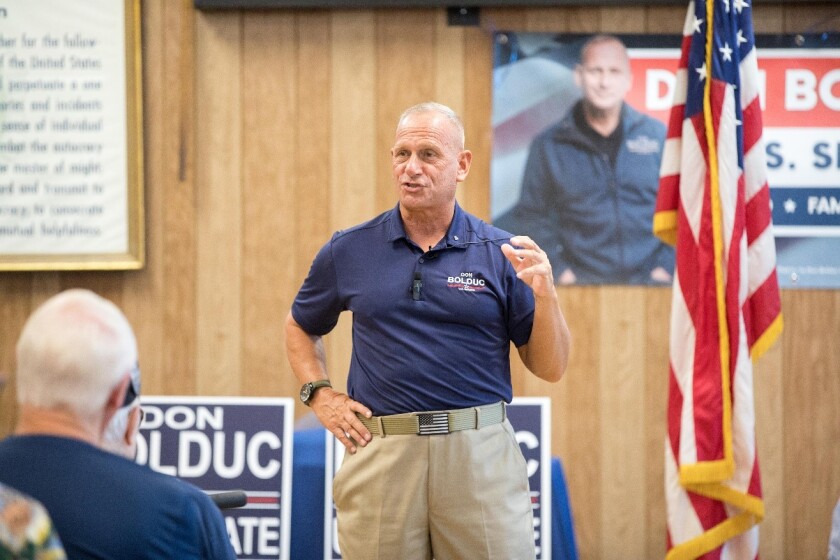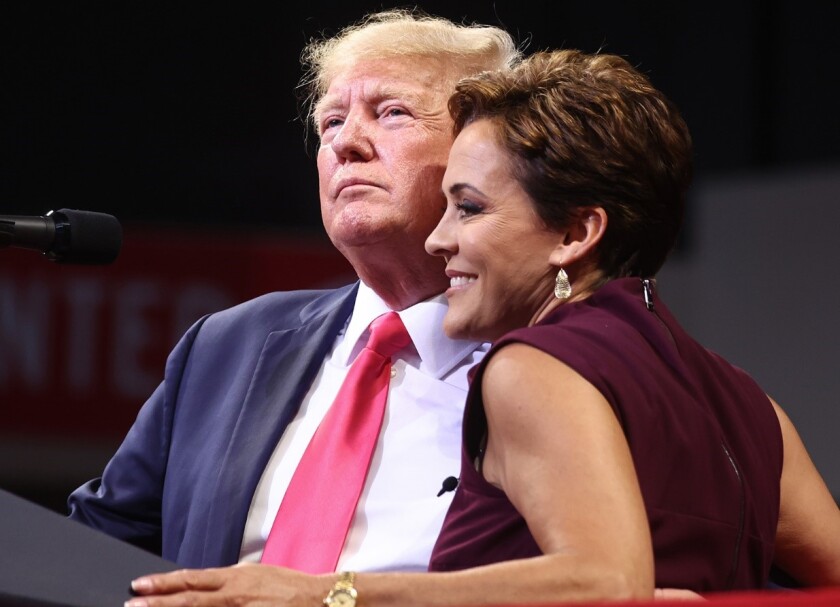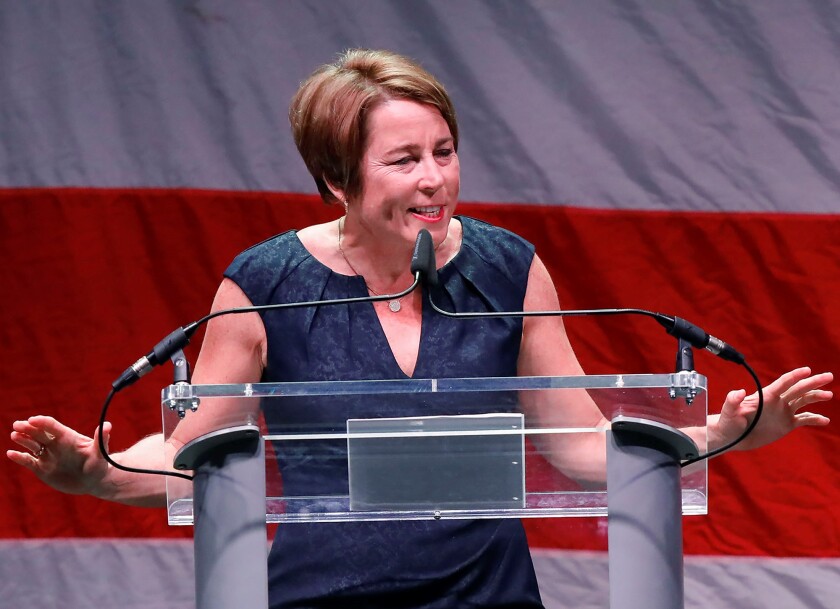Progressives Fall Short in Final Primaries: The year’s primary season reached its conclusion in three Northeastern states on Tuesday, with the most significant state-level result being the victory of Gov. Dan McKee in Rhode Island’s Democratic primary. This marks the first midterm cycle in 20 years that no sitting governor was knocked off in a primary.
McKee took office last year after President Biden’s appointment of Gina Raimondo as commerce secretary. Almost as soon as he was sworn in, McKee awarded a $5 million education contract to a former political adviser. He’s now under federal investigation. He benefited from a large primary field, which split both opposition to him and the progressive vote.
McKee took 33 percent of the vote, which was enough to beat former CVS executive Helena Foulkes, who had the backing of U.S. House Speaker Nancy Pelosi and took 30 percent, as well as Secretary of State Nellie Gorbea, who won 26 percent. Matt Brown, a former secretary of state, had Vermont Sen. Bernie Sanders’ support, but only carried 8 percent of the primary vote. Despite his tepid showing, McKee will be heavily favored against Republican Ashley Kalus, a free-spending newcomer to the state.
At the legislative level, the “revolution” promised by the Rhode Island Political Cooperative and other groups on the left did not occur. Most incumbents fended off challenges brought by progressives, including state House Speaker Joseph Shekarchi and Senate President Dominick Ruggerio. State Sen. Jeanine Calkin, a cofounder of the Coop, went down to defeat in her primary.
Three state representatives – Anastasia Williams, Jean Philippe Barros and James McLaughlin – did lose to lefty challengers, however. And progressive Jennifer Rourke – whose Republican opponent dropped out after assaulting her at an abortion rights rally in June – defeated a fellow Democrat who’d shared a photo of himself in blackface on social media.
In Delaware, the other deep-blue state voting Tuesday, progressives were not as successful at knocking off incumbents as they had been in 2020. Two incumbents lost, however. Larry Mitchell – the House majority whip and one of a handful of legislators left who voted a decade ago against an anti-discrimination bill protecting transgender rights – lost to DeShanna Neal, a trans rights advocate, by a couple dozen votes. Colin Bonini, a 28-year state senator, lost to Kent County Levy Court Commissioner Eric Buckson, the son of David Buckson, a former state attorney general who served as governor for 19 days more than 60 years ago.
State Auditor Kathy McGuiness was soundly defeated by Lydia York in the Democratic primary for state auditor. McGuiness has been convicted but not sentenced for corruption charges stemming from hiring her daughter.

Bolduc has pledged he won’t vote to certify the 2024 presidential election result, assuming Trump were to run and lose. Democratic Sen. Maggie Hassan, who won her 2016 race by 1,000 votes, is still considered vulnerable, but prognosticators quickly tilted their ratings toward Democrats in all three races. “New Hampshire Republicans, after Trump lost there twice, may have just thrown away a Senate seat and two House seats with Trumpy nominees – which for all we know could be the margin in both chambers,” tweeted Jonathan Bernstein, a political scientist and Bloomberg columnist.
With the primaries over, it’s worth pausing to reflect on how different the fall landscape might look if Republicans had succeeded in recruiting Sununu and other governors, including Vermont’s Phil Scott and Arizona’s Doug Ducey, to run for Senate. Sununu would have a much stronger shot against Hassan than Bolduc; Ducey would not be floundering in polls as newbie nominee Blake Masters is; and Scott would have made the open seat in Vermont at least competitive, which currently it’s not. “If he would have run, he likely would have won,” Andrew Smith, a pollster at the University of New Hampshire, says of Sununu.
But none of them were interested in enduring the hassle of taking on challengers tied to Trump. The same is true of Charlie Baker of Massachusetts, one of the most popular governors in the country, who opted against running for re-election, essentially guaranteeing the election of state Attorney General Maura Healey, who won the Democratic nomination for governor last week.
In Sununu’s case, he has a close understanding of how frustrating political life in Washington can be. His brother served in the Senate, and he grew up there while his father was serving as White House chief of staff. “I’d rather push myself 120 miles an hour delivering wins for New Hampshire than to slow down, end up on Capitol Hill debating partisan politics without results,” Gov. Sununu said last year in announcing his decision to seek a fourth term as governor.
“I don’t think he ever wanted to run for Senate,” says Smith, the pollster. “He’s a governor and he’s also an engineer. He likes to run things, and as a senator, you don’t run anything.”
As things stand, Sununu should have no trouble in his re-election run against Democratic state Sen. Tom Sherman.
State Supreme Court Justices Defend Own Role: One of the blockbuster cases before the Supreme Court this fall is Moore v. Harper, a North Carolina redistricting case that hangs on the so-called independent state legislature theory. I wrote about this at length here, but the basic claim made by plaintiffs is that legislatures, and only legislatures, have authority under the U.S. Constitution to run federal elections. State courts and potentially other actors such as governors have no proper role in checking legislative decisions.
If the court finds in their favor, this would have huge implications not only for redistricting but voting rights and election law and management in general. As such, it’s drawn a flurry of amicus, or friend of the court, briefs, including one from 13 Republican attorneys general in support of the claim. But other voices warn that the Supreme Court blessing the independent state legislature theory would not only undermine checks and balances but democracy itself.
Notable in opposition was a brief from the Conference of Chief Justices, an organization representing top state court officials. Its amicus committee is dominated by current and former justices from ruby-red states. State constitutions and history make it clear that state courts have the power to review legislative actions, including election laws, their brief points out: “While the text of the Elections Clause requires that state legislatures prescribe the laws governing federal elections, it does not otherwise displace the states’ established authority to determine the final content of their election laws, including through normal judicial review for constitutionality.”
It's significant that state chief justices have decided to weigh in this way, says Thomas Wolf, deputy director of the democracy program at the Brennan Center for Justice. “State supreme court justices are as close to peers to U.S. Supreme Court justices as you’ll find,” he says. “When they do speak, the rareness of them commenting means that the words carry extra weight.”
Several justices on the U.S. Supreme Court have expressed support for the independent state legislature theory. But the chief justices’ brief points out that it’s perfectly consistent with the Constitution for legislatures to invite their own state courts to weigh in on election law – which is what happened in North Carolina, where the General Assembly itself passed a law allowing the state supreme court to review redistricting maps.

Wednesday morning, Supervisor Sheila Kuehl – a leading Villanueva critic – had her house searched by deputies. It may be related to a broader investigation into a county contract with a nonprofit but some suspect retaliation. Deputies also searched the home of a member of the Sheriff Civilian Oversight Commission, which has been holding hearings about possible gang activity among deputies. Talking to reporters outside her home, Kuehl said that the judge who signed the warrant is a friend of the sheriff and said there is no investigation going on that would justify the search.
“A corrupt sheriff with a track record of abusing his power and trying to silence his critics is conducting a bogus, vindictive, politically motivated witch hunt against Sheila Kuehl,” said Mike Bonin, a member of the L.A. City Council.
Previous Editions
-
Democrats shouldn't count their chickens yet; what happens when election deniers run elections; and what the courts have to say.
-
The share of female governorships could exceed 20 percent this year, more women are registering and more incumbents are losing. There's also a revolution in the courts as states use unconstitutional maps.
-
Inside politics: Key governor contests are set with abortion as the central issue; a defense of state Senates puts the focus on Nebraska; and, once again, a big number of legislators are facing no competition in elections.
-
Eric Greitens splits the Republican party, Trump notches another win and Texas Democrats are betting on Beto.













